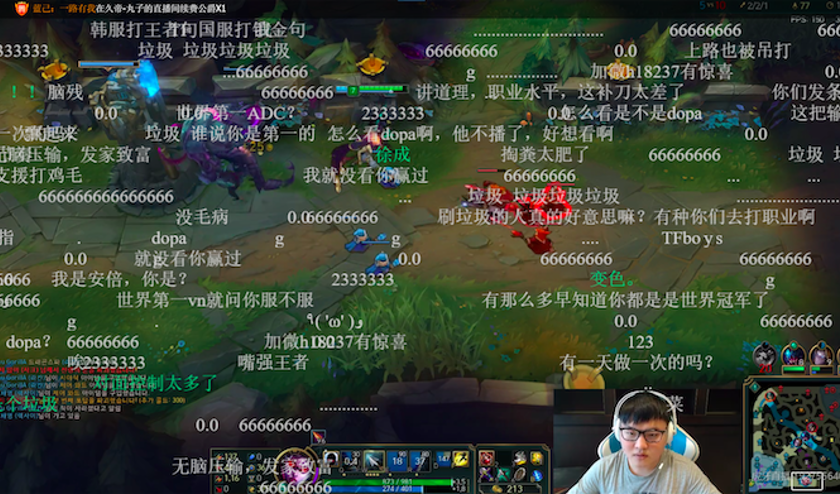
Esports & Streaming: Is China ahead of us?

If you have ever been a gamer, then you are probably familiar with the standard line that your parents tell you after gaming for several hours: “Stop playing so many video games, you can’t make a living out of that”. Nowadays this is no longer true, esports (making money playing video games professionally) is a booming business.
Besides competing in tournaments where gamers can win over seven figures, they can also raise money by simply playing video games on online streaming platforms. Depending on the number of viewers, subscribers and donations, streamers can make a good living out of their hobby.
According to a recent report by iResearch, the Chinese esports and streaming industry has experienced significant growth year after year since it entered the development stage in 2009. This was way before the boom in North America and Europe. Chinese investors have poured significant sums of money into the industry, most notably in the various online streaming platforms. Just last week, Chinese giant Tencent announced it will invest 13 billion dollars (!) into esports and streaming. Enough reasons for us to discover the Chinese market.
MAJOR PLATFORMS YOU PROBABLY HAVE NEVER HEARD OF
As we love to watch our favorite North American and European players broadcast on Twitch, China has its own local platforms where its domestic gaming heroes stream. With over 200 million esports fans, the market is big enough for multiple different streaming platforms, each with unique features and popular streamers. The most popular platforms in China are Douyu TV, Huya Live, and Panda TV. Together, these three major platforms cover approximately two-thirds of the total viewership in China. Let’s take a closer look at these market leaders.
DOUYU TV
Douyu, formerly known as AcFun, was founded in 2013. The platform is the leading esports streaming platform in China, it claims to have over 100 million registered members and 15 million daily active users. Douyu has many famous streamers playing Tencent-published games such as League of Legends. Headliners are League of Legends streamers: the 2014 World’s Champion Winner Imp and old-time favorite former professional player Wh1t3zZ.
HUYA LIVE
A major competitor is Huya Live, a video streaming platform owned by YY Inc. (a NASDAQ company) and previously known as YY Live. YY Inc.’s platforms generated almost $1.2 billion revenue in 2016. In addition, Huya Live captured major investments from other large organisations, as its popularity was boosted by well-known domestic streamers. In 2016, the company even snatched China’s favorite ADC player Uzi from its competitors.
In comparison, North America’s most famous ADC player Doublelift, cannot even come close to challenging Uzi’s viewership. In fact, Uzi has consistently over 100,000 people watching his stream live and has currently 2,200,000 subscribers, which is twice the number of his North American counterpart.
PANDA TV
Panda TV is a streaming platform created in 2015 by Wang Sicong, the son of multimillionaire Wang Jianlin. The platform may not have as many users as Douyu TV. But it does have exclusive contracts with different popular esports teams such as Invictus Gaming and Team Secret, because of these deals Panda manages to attract masses of daily viewers.
EXCLUSIVE TO CHINA
So, why do we only use Twitch and have we never even heard of these Chinese platforms?
For a start, the Chinese platforms are only available in Chinese. There is no way to view the website in a different language. Most of the streamers and viewers only speak in their native language. Because of these barriers, it’s impossible for foreigners to take part in these communities. Even for outsiders, who are familiar with the Chinese language, it is still difficult to understand the platform jargon due to local slang or gaming abbreviations.
Secondly, the accessibility of the platforms is rather lacklustre. Although all platforms are available in web and app versions, you can only find the apps by searching in Chinese characters. Also, the loading times for people watching from America and Europe are bad compared to Western platforms. Finally, creating a Chinese account is only possible through social media accounts (mainly Chinese social media) or with a Chinese phone number. Not something an average Western viewer has easy access to.
On the surface, Chinese streaming platforms appear identical to their Western counterpart Twitch. But dig a bit deeper, and add-ons and integrated cultural features become visible that are widely different from what the West would expect. These differences can be explained by the Chinese cultural background.
THE GUANXI AND MIANZI EFFECT
Before diving deeper into the features of the platforms, it is crucial to have some understanding of the Chinese culture and habits. “Guanxi” and “Mianzi” are two complicated Chinese concepts, but they are essential in order to get a grip of the nation’s culture.
Guanxi consists of two Chinese characters. “Guan” which means a gate, whereas “Xi” refers to a relationship or connection. The two characters together literally means “Pass the gate and get connected”. In brief, Guanxi stands for relationships and social networking. In the Chinese culture, more than in the Western culture, it is preferable to have connections or relationships with influential and powerful individuals, as this will not only give you more advantages and privileges, but also more Mianzi.
The Chinese phrase Mianzi literally means face and can be referred to prestige, status or reputation in the society. In China, citizens are very concerned about how they are perceived by others (even more than Westerns). That is why people are so competitive, you often see them fighting for the number one spot. The concept is very dominant in China, as for some people Mianzi is worth more than large sums of money.
Chinese people, or, more accurately, Asian people in general, like to gamble. It is a socially acceptable form of entertainment. For many Chinese individuals, gambling is a notion of luck, it can be perceived as a social activity. Being part of a social event and being able to afford to gamble can be associated with the two Chinese customs Guanxi and Mianzi.
Consequently, all these customs and habits are visible in the Chinese platforms. To illustrate this: when you become a member on any of the platforms, you will receive an account that starts at a specific level or rank (e.g. bronze, silver, gold). The higher the account ranks the more privileges you will receive. It is no surprise that investing money into these platforms is the fastest way to increase your status.
So, how are these Chinese platforms different from Twitch and how are they associated with local cultural concepts and habits?
All major differences between the Chinese platforms and Twitch are related to Guanxi and Mianzi and money spent to achieve this.

An interesting example is a chatroom. Despite activating the full screen, viewers still see comments on the broadcast. Words are flying over the screen from left to right. In exchange for money, users can highlight their own comments by giving it a color or a background.
BEING A NOBLE IS NOT CHEAP
On Douyu TV and Huya Live, members have the possibility to buy a noble status. The statuses are ranked starting from being a Knife, to be being Duke, to Earl, to Viscount, to King, to Emperor, each higher status providing different extra advantages. Having a high status can cost a small fortune. Being an Emperor on Douyu TV will cost you $20,000 and is not even permanent (it is subscription-based).
Not only the prices may surprise many, the advantages are sometimes also rather extreme, even to the point where you get the privilege to call a girl-streamer during her live broadcast. The purpose is quite simple, it pleases the Guanxi and Mianzi effects in the society. Many Chinese citizens are willing to spend a large amount of money for these titles and advantages. Those people are more likely to be respected by others.
All the platforms have their own unique ways to represent different donation rankings and VIP rankings. In fact, Douyu TV and Panda TV even have a special page that displays all the achieved rankings per category. The pages consist of different kind of rankings, such as popularity, the number of fans, the number of donations, etc. These socially integrated features can be seen money grabbers because the only way to rank high is by pumping a lot of money into the platform. But then again, what is money if you can’t show it to others via your (purchased) status.
WHY JUST WATCH, WHY NOT BET?
All Chinese platforms have special featured pages for gaming tournaments. Besides the tournament broadcast itself, the page displays the ranking points, match schedule, and team information. You can make it even more exciting by putting your money into the match. These features are incredibly popular in China. How much money is being spent here is unknown. One thing is for sure, there is a reason why many Chinese companies invest heavily in these platforms.
SO, WHAT’S NEXT?
In China, competitive gaming does not only exist in the games themselves but is also reflected in the whole game streaming industry. Chinese platforms are continuously competing to become the country’s number one streaming platform. As competition is becoming more and more fierce, Chinese platforms are expected to come up with various kinds of innovative offerings. Twitch, on the other hand, has been dominating the Western streaming industry for years. Twitch occasionally introduces upgrades that are like existing Chinese features, but then in a more Western style. We can safely say many of Twitch latest features (for example: donating bits to streamers) are inspired by Asian platforms.
There are many incremental differences that differentiate the Chinese platforms from Twitch. Many of these Chinese innovative features are results from integrated cultural habits and concepts such as Guanxi and Mianzi. The way the features are designed pleases the Chinese viewer base. Chinese streaming platforms have discovered a way to craft a revenue stream using socially accepted standards as a foundation. What can we learn from this? When dealing with the Chinese market or adopting Chinese ideas, it is crucial for investors in streaming and esports to look beyond the surface. Always be aware of China’s cultural habits.
Overall, despite all the different kinds of platforms, it does not matter whether you like to follow the North American LCS on Twitch; or like to see Uzi on Huya Live or watch DOTA streams in Chinese on Douyu, we all have one thing in common and that is we are consuming the future of entertainment.
Interested in esports or streaming? Let’s get in contact! c.dubelaar@wearetriple.com